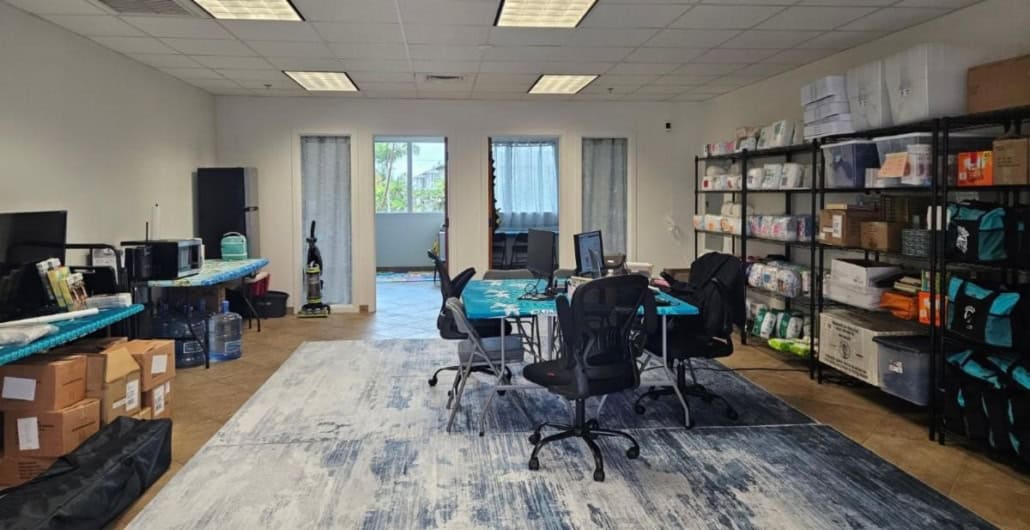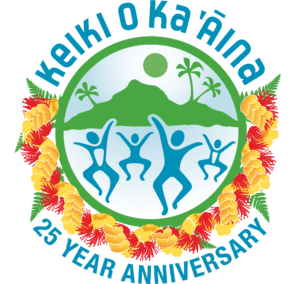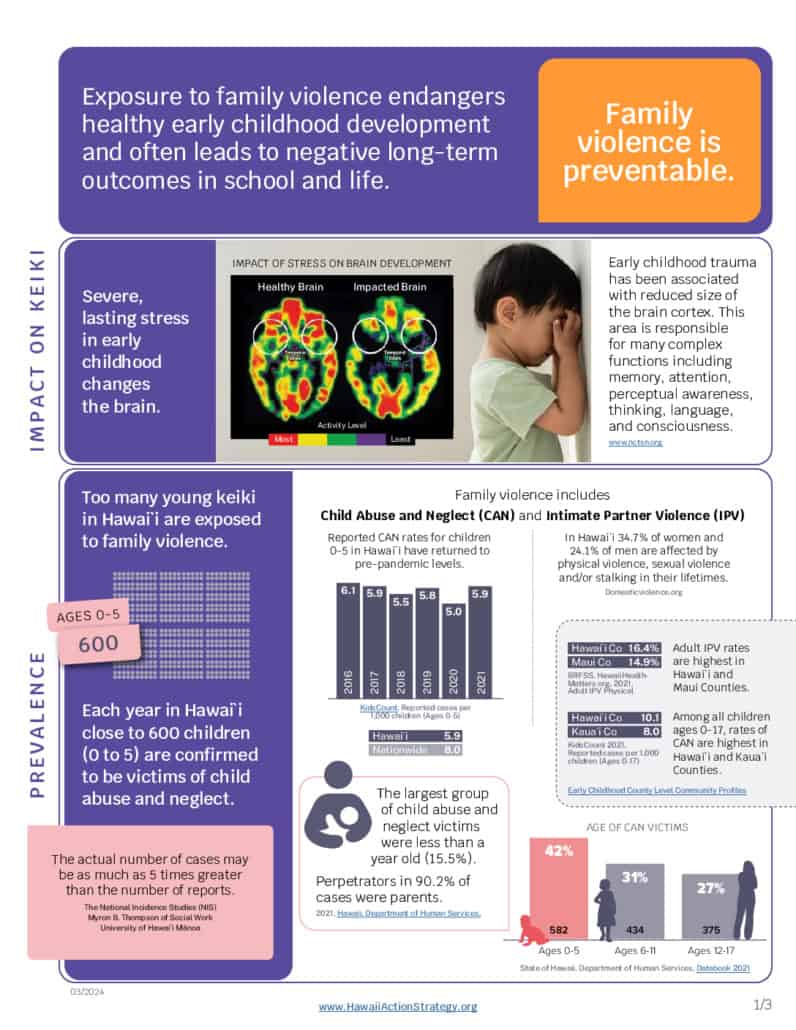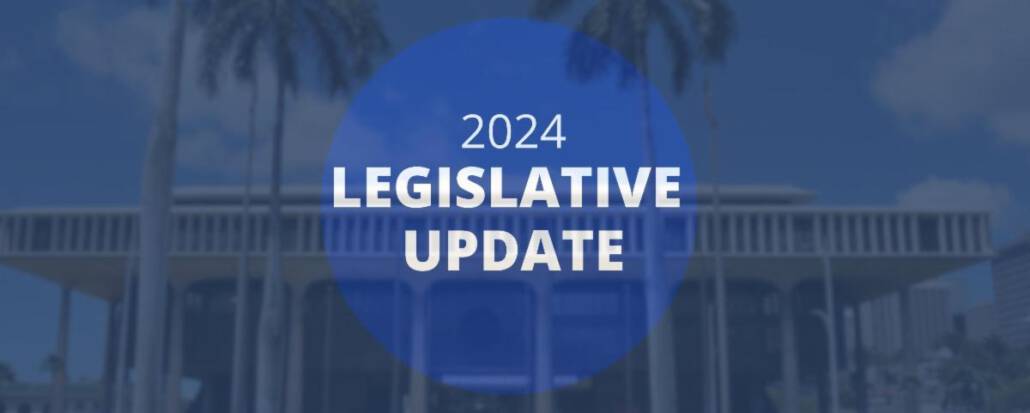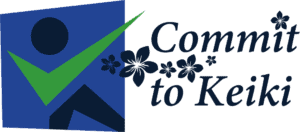MAUI RECOVERY SPOTLIGHT
Keiki O Ka ʻĀina Family Learning Centers
Commit to Keiki’s Maui Recovery Spotlight Series highlights local organizations and nonprofits that have been working to ensure that Maui’s youngest keiki and their families receive the support and resources they need in the wake of the devastating wildfires. In this month’s newsletter, we are spotlighting Keiki O Ka ʻĀina Family Learning Centers which recently opened a new office space in Lahaina for families to receive support.
Keiki O Ka `Āina Family Learning Center in Lahaina
Keiki O Ka ʻĀina Family Learning Centers
Q&A with Me’ja Kaniho
Program Director, Keiki O Ka ʻĀina He Lei Piko Home Visiting Programs
Q: What is the mission of Keiki o Ka ʻĀina Family Learning Centers
A: The Mission of Keiki O Ka `Āina Family Learning Centers (KOKA-FLC) is to Educate Children, Strengthen Families, Enrich Communities and Perpetuate Culture. We fulfill our mission by communicating the vital importance of education, advocating for literacy, supporting parents as their keiki’s first and best teacher, and empowering families to undertake leadership roles in their communities. All of this is done within the context of Hawaiian language, traditions and values.
In October 2005, KOKA opened our first parent participation preschool on Maui at Kahului Elementary. We operated out of the cafeteria and were lucky to store our things on the stage. We also opened a teen parent program at Maui High School where teen moms could leave their children with us while they went to class, and our caregivers helped take care of them. We also started the Parents as Teachers visiting programs in the Maui correctional center for fathers and mothers who had children ages zero to three. In 2012, KOKA started to provide tuition assistance for families with children through the Native Hawaiian Childcare Block Grant. In 2014, our programs expanded to include Maternal, Infant, and Early Childhood Home Visiting (MIECHV) for parents with children ages zero to five years old as we opened two new offices in Wailuku. Our curriculums included the Parents as Teachers and the Home Instruction for Parents of Preschool Youngsters programs and we supported families in the Wailuku, Kahului, and Kihei areas.
Currently, KOKA is blessed to continue our MIECHV home visiting programs and to have expanded our service locations to include our Lahaina community where we have been able to establish a new office space for families to receive support. Our Parent Participation Program also continues to thrive in Wailuku.
Q: What is your organization’s role in helping families with young children who’ve been affected by the wildfires on Maui? What was your immediate response after the fires?
A: Keiki O Ka ‘Āina’s role in helping families with young children affected by the wildfires on Maui is to support families in restoring safety, continuity, and normalcy during this time of uncertainty and transition. To kūlia i ka nuʻu or strive for the highest to get back to a place of stability in their naʻau (mind/heart).
Since the Wildfires:
Laulima (Joint Action): Immediate response (within 3 days):
- Collaborating with the Lahaina Disaster Recovery Teams to provide basic essentials for families.
- Partnering with Rainbow Helicopters to provide clothing, bedding and camping/emergency supplies.
- Coordinating diapers, wipes, baby food, and formula deliveries to the Lahaina community.
- Providing hygiene, cleaning, disinfecting items and basics like food staples and water.
- Supporting keiki by providing books, toys, puzzles and engaging/comforting activities after losing so much.
Lōkahi (Unity): Continued commitment (within 3 weeks):
- Collaborating with Department of Health, Maui County, and the Governorʻs Office of Wellness and Resilience to provide mental health supports for caregivers and children on the ground at the shelters.
- Providing mental and emotional health supports through door-to-door wellness checks at community shelters to evaluate need for additional mental health supports.
- Easing the load for parents by keeping keiki engaged with books and activities while having these difficult conversations with parents.
- Holding space for parents as they shared their trauma.
Mālama (Maintain): Sustained connection (to the present):
- Maintaining our presence at the Disaster Recovery Center (DRC) to continue connecting families to our community partners that would best meet their needs.
- Reducing the barriers to help through connection to these resources and our Trauma-Informed Home Visiting Program.
- Promoting the development of the keiki’s resiliency after experiencing the trauma.
- Providing weekly home visiting supports and connecting Lahaina families through monthly group connections with others Lahaina families who experienced the fire.
- Support toward mitigating stressors that these families face to open space for parents to dedicate themselves to becoming their keikiʻs first and best teacher.
- Bringing the holiday season to the families by sponsoring them through our Laulima Giving Program to gift them with essentials like groceries, gas, learning materials, games, and baby items.
- Providing caregivers with opportunities to spend intentional time with their keiki.
With Aloha, KOKA strives to help the families affected by the fires to feel connected and supported by developing a sense of attachment and community, and our support services promote the importance of these family and community bonds. Our ultimate goal is to ensure that these families have access to resources and assistance they need to navigate the challenges they face, and to help them feel connected to their community and loved ones.
Q: What are the current needs of families with young children on Maui?
A: Maluhia (Peace/Security): Long-term Affordable Housing
Community members rely on a sense of safety and belonging in the place they call their home. Families are being vacated from the shelters and hotels with limited access to sustainable housing. The ability to find and maintain adequate and affordable housing is of the utmost importance.
Hilinaʻi (Trust): Childcare
Dependable, flexible, and affordable child care so that caregivers can confidently remain in and/or return to the workforce and still care for their families.
Ola (health/wellbeing): Continuous and Culturally Appropriate Mental Health and Counseling Supports
Maintaining consistent localized agencies from our communities that understand the culture and experiences of those that live in the wildfire affected areas not just as survivors but as Lahaina community members raising children in trauma. Cultural approaches are key to supporting this healing effort.
Hāpai (Carry/elevate): Infant Mental Health Support
Babies and toddlers are directly affected by trauma. They are also affected if their caregiver is suffering consequences of trauma. Offering families long-term consistent access to infant mental health specialists or those with infant mental health specialization is essential to support the babies affected by the wildfires.
Waena (central): Locally-accessible Basic Needs
The families affected by the fires need consistent access in Lahaina to federal, state, and social service agencies. Having a centralized location in Lahaina where families can receive needed resources would mitigate time and transportation stressors for the many families who endured loss of transportation and other basics and struggle with finding childcare.
Q: What are your needs in order to continue to provide services to families with young children on Maui in the long term?
A: Staffing:
To provide services to the Lahaina families, we need staff who are eager to work in home visiting and in the greater early childhood field. They should be connected to the immediate and long-term needs of those who reside in Lahaina and be passionate about helping Lahaina caregivers and their children reconnect with each other and focus on attachment building and supporting keiki’s development and growth.
Safe and dedicated spaces for community members to engage:
These spaces would help to foster a sense of belonging, facilitate communication, and promote community involvement. They would enable individuals from diverse backgrounds and locations to come together, share information, discuss common interests, and support one another grief process and help to foster healing.
Investment in Early Childhood Education Professional Development:
Investing in the promotion of the Early Childhood Education field can build the pathway for a future of dedicated ECE professionals. Assisting with educational expenses like tuition and books can remove barriers for those who are interested in the field. Offering aid toward attendance of conferences and trainings promotes retention and connection of those who are working in the field.
Consistent Program Funding:
Programs like these require reliable and consistent funding to continue operating. After the trauma from the fires, Lahaina families need programs that they can trust will not leave them.

